- Home
- Jan-Philipp Sendker
A Well-Tempered Heart
A Well-Tempered Heart Read online
ALSO BY JAN-PHILIPP SENDKER
The Art of Hearing Heartbeats
Copyright © 2012 by Karl Blessing Verlag
Originally published in German as Herzenstimmen by
Karl Blessing Verlag, Munich, in 2012
Translation copyright © 2013 by Kevin Wiliarty
Production Editor: Yvonne E. Cárdenas
All rights reserved. No part of this publication may be reproduced or transmitted in any form or by any means, electronic or mechanical, including photocopying, recording, or by any information storage and retrieval system, without written permission from Other Press LLC, except in the case of brief quotations in reviews for inclusion in a magazine, newspaper, or broadcast. For information write to Other Press LLC, 2 Park Avenue, 24th Floor, New York, NY 10016. Or visit our Web site: www.otherpress.com
The Library of Congress has cataloged the printed edition as follows:
Sendker, Jan-Philipp.
[Herzenstimmen. English]
A well-tempered heart : a novel / Jan-Philipp Sendker ; Translated from the German by Kevin Wiliarty.
pages cm
“Originally published in German by Karl Blessing Verlag in 2012.”
ISBN 978-1-59051-640-9 (pbk.) — ISBN 978-1-59051-641-6
(ebook) 1. Americans—Burma—Fiction. 2. Child soldiers—Burma—Fiction. 3. Burma—Fiction. 4. Burma—War—Fiction. 5. Burma—Women—Fiction. I. Wiliarty, Kevin translator.
II. Title.
PT2721.E54H413 2014
833′.92—dc23
2013015062
Publisher’s Note:
This is a work of fiction. Names, characters, places, and incidents either are the product of the author’s imagination or are used fictitiously, and any resemblance to actual persons, living or dead, events, or locales is entirely coincidental.
v3.1
To Anna, Florentine, Theresa, and Jonathan
Contents
Cover
Other Books by This Author
Title Page
Copyright
Dedication
Part One
Chapter 1
Chapter 2
Chapter 3
Chapter 4
Chapter 5
Chapter 6
Chapter 7
Chapter 8
Chapter 9
Chapter 10
Part Two
Chapter 1
Chapter 2
Chapter 3
Chapter 4
Chapter 5
Chapter 6
Chapter 7
Chapter 8
Chapter 9
Chapter 10
Chapter 11
Chapter 12
Chapter 13
Chapter 14
Chapter 15
Chapter 16
Chapter 17
Chapter 18
Chapter 19
Chapter 20
Chapter 21
Chapter 22
Part Three
Chapter 1
Chapter 2
Chapter 3
Chapter 4
Chapter 5
Chapter 6
Chapter 7
Chapter 8
Chapter 9
Chapter 10
Acknowledgments
About the Authors
Chapter 1
THE DEEP BLUE morning sky was clear as a bell the day my life lurched off course. It was a crisp, cold Friday, the week before Thanksgiving. I have often wondered whether I ought to have seen it coming. How could I have missed it? How could I have failed so utterly to anticipate such a calamitous event? Me of all people? A woman who hated surprises. Who prepared meticulously for every meeting, every trip, even a weekend excursion or a casual dinner with friends. I was never one to leave anything to chance. I found the unexpected almost intolerable. Spontaneity held no attraction for me.
Amy insisted that there must have been early portents, that there always are. Except that we are so engrossed in our day-to-day lives, prisoners of our own routines, that we forget to look for them.
The little details that speak volumes.
According to her we are each our own greatest mystery, and our life’s work is to solve ourselves. None of us ever succeeds, she says, but it is our duty to follow the trail. Regardless of how long it is or where it might lead.
I had my doubts. Amy’s beliefs and my own often diverged. Which is not to say that I did not see her point in this case, at least to a certain extent. There may well have been the occasional incident over the past several months, things that ought to have raised an alarm. But how much time can we devote to eavesdropping on our inner selves just on the off chance that we might pick up some token or clue, the key to some puzzle or other?
I was not one to regard every physical aberration as symptomatic of some disturbance to my spiritual equilibrium.
Those little red pimples on my neck—the ones that developed within a few days into a painful, burning rash that no doctor could explain, the ones that vanished a few weeks later as suddenly as they had appeared—those might have been caused by anything. Likewise the occasional rushing in my ears. The insomnia. The increasing irritability and impatience, directed mostly at myself. I was well acquainted with both feelings, and I attributed them to the workload at the office. The price everyone in the firm had to pay, the price we were all willing to pay. I had no complaints.
The letter was sitting there in the middle of my desk. In a slightly crumpled light-blue airmail envelope, the kind one hardly uses anymore. I recognized his handwriting at once. No one else I knew lavished such care on penmanship. He treated each correspondence as a miniature artwork. He gave each swooping line meticulous attention worthy of calligraphy. Each letter of each word was a gift. Two pages, tightly packed, every sentence, every line set to paper with the devotion and passion felt only by someone for whom writing is a treasure beyond all price.
On the envelope an American stamp. He must have entrusted it to some tourist; that was the fastest and safest way. I looked at the clock. Our next meeting was scheduled to begin in two minutes, but curiosity got the better of me. I opened the envelope and hastily scanned the first few lines.
A loud knock wrenched me back. There was Mulligan standing in the door, his broad, muscular frame nearly filling the space. I would have liked to ask for a moment’s patience. A letter from my brother in Burma. A little masterpiece that … He smiled, and before I could say a word he tapped a forefinger on his chunky wristwatch. I nodded. Mulligan was one of the partners at Simon & Koons, our best attorney, but he had no appreciation for penmanship as a gift. His own scrawl was illegible.
The rest of my colleagues were already waiting. You could smell the fresh coffee; the room grew quiet as we sat down. In the coming weeks we were going to be filing a claim on behalf of our most important client. A complicated story. Copyright infringement, illegal knockoffs from America and China, damages in the hundreds of millions. Time was of the essence.
Mulligan spoke softly, and yet his deep voice resonated throughout every corner of the room. After only a few sentences I was already finding it difficult to follow him. I tried to focus on his words, but something kept distracting me, drawing me out of the room. Away from this world of charges and countercharges.
I was thinking of my brother in Burma. I saw him suddenly before me. I thought of our first meeting in the dilapidated teahouse in Kalaw. How he had stared at me and then suddenly approached me. In his white but yellowing shirt, his faded longyi, and his worn-out flip-flops. The half brother whose existence I had never suspected. I took him for an old beggar angling for a handout. I remembered the way he sat down at my table to ask me a question. “Do you believe in
love, Julia?” I hear his voice in my head to this very day. As if time had stood still for this question. I had laughed—and it had not bothered him.
While Mulligan was droning on about the “value of intellectual property” I recalled my half brother’s first sentences. Verbatim. “I am serious,” U Ba had continued, undeterred by my laughter. “I speak of a love that brings sight to the blind. Of a love stronger than fear. I speak of a love that breathes meaning into life …”
No, I had eventually answered. No, I don’t believe in anything of the kind.
Over the next few days U Ba had shown me the error of my ways. And now? Almost ten years later? Did I believe in a power that brought sight to the blind? Would I be able to convince a single person in this company that a person can triumph over selfishness? They would die laughing.
Mulligan was still rattling on about “the most important case of the year … so that we have to …” I was doing my best to concentrate, but my thoughts kept drifting, aimless, like scraps of wood tossed by the waves.
“Julia.” Mulligan brought me abruptly back to Manhattan. “It’s all you.”
I nodded at him, cast a desperate glance at my notes, and was planning to lead in with a few standard openings when a faint whisper interrupted me.
I faltered.
Who are you?
A mere breath, and yet unmistakable.
Who are you?
A woman’s voice. Still quiet, but clear and distinct.
I looked over my right shoulder to see who was interrupting me with a question like that at a moment like this. No one.
Where else would it come from?
Who are you?
I looked instinctively to the left. Nothing. A whisper from nowhere.
What do these men want from you?
Tense silence on all sides. I took a deep breath and exhaled slowly. I felt flushed. I sat tongue-tied, eyes down. Someone cleared his throat.
Be on your guard.
“Julia?”
Not a word. Not one. Shortness of breath. Where was this voice coming from? Who was that talking to me? What did she want? What did I have to fear from my colleagues?
“Feel free to jump right in. We’re all ears.” Mulligan’s growing impatience. Disapproving coughs.
Take great care. Watch what you say. Be careful who you look at.
I raised my head and glanced cautiously around. Upper bodies rocking uneasily. Marc’s worried expression; he felt my pain. I imagine. A smirk flitted across Frank’s broad face. As if he’d always known the day would come when I would crumble pathetically under the pressure.
You mustn’t trust them, no matter what they say.
That voice cinched my throat shut. I was paralyzed. Their faces ran together. Sweaty palms. My heart beat faster.
“Julia. Are you okay?”
No one will help you.
“If I may …” I began.
Utter silence once again. It had sounded louder than necessary. More of a cry than a polite request for attention. Their glances. The ensuing silence. I felt dizzy. On the brink of collapse.
“Would you like some water?”
It sounded sincere. Or was I fooling myself? Did I need to be on my guard?
Not a word, now. Hold your tongue.
A dark chasm opened before me, yawning wider by the second. I wanted to hide, to crawl off somewhere. What in the world was happening to me? I was hearing a voice, plain as day. A voice I had no control over. A stranger. Inside me. I felt myself getting smaller and smaller. Smaller and needier. I would not be able to say another word until it was quiet again in my head. I pressed on my ears a couple of times, quickly and sharply, the way I did when the occasional rushing got too loud. I tried another deep breath and knew right away it was pointless.
They mean you no good. Their smiles are false. They are dangerous.
Scream. Drown her out with my own real voice. LEAVE ME ALONE. STOP TALKING. STOP. STOP.
Not a word. Not one.
Mulligan and I exchanged looks. I realized it was true that no one in this room could help me. I had to get out. Immediately. I would go to the restroom, to my office, home, it didn’t matter, as long as it was away from here. They were here for a presentation. They were expecting ideas and proposals, and if I wasn’t up to the job, at least I owed them an explanation for my behavior. An apology. I was in no position to give them either one. I didn’t have the strength. I had nothing to say. A brief hesitation, then I slowly straightened up, pushing back my chair and rising. My legs were quivering.
What are you doing?
“What the hell is going on here, Julia?”
I gathered my papers, turned away, and headed for the door. Mulligan was shouting something, but I could no longer understand a word he was saying.
I opened the door, stepped out, and closed it quietly behind me.
Now what?
I walked down the hall past the restrooms to my office, set the documents on my desk, took my coat, tucked U Ba’s letter into my handbag, and left the office calmly and without another word.
I had as yet no idea that I had unwittingly set off on my journey. On that fall day, icy cold and clear as a bell, in the week before Thanksgiving.
Chapter 2
Kalaw, November ninth
In the year two thousand six
My dear little sister,
I hope this letter finds you in good spirits and good health. Please forgive my long silence. I no longer recall precisely when last I found the time to write you a few lines. Was it in the heat of the summer or yet before the turn of the monsoon?
It seems that an eternity has passed since then, though little enough has transpired in my life and in Kalaw. The astrologer’s wife has fallen ill and will soon die; the daughter of the owner of the teahouse where we first met now has a son. It is the same kind of comings and goings as anywhere else in the world, is it not? And yet our life here has a different rhythm from yours, as you may recall. As for me, I must confess that I am unable to imagine how quickly your world turns.
I myself am doing well. I continue to restore my old books, though the task grows increasingly strenuous and exhausting with the passage of time. It is my eyes, little sister. They deteriorate from day to day. I am gradually reaching the age of fading light. To make matters worse, my right hand has fallen further into the unwelcome habit of trembling slightly, which does not make it any easier to paste the little bits of paper over the holes bored incessantly into the pages by the ravenous vermin. Where previously three months sufficed to restore one of my books to legibility, I now require half a year or even more in the case of weightier volumes. Yet what good does it do, I sometimes ask myself, to spur myself on? If there is one thing I possess enough of, it is time. Only in old age do we fully appreciate the value of time, and I am a wealthy man. But let me not burden you with an old man’s ailments! If I do not rein in my pen, you will soon begin to worry about your brother, an utterly unfounded concern. I lack nothing.
Unless I am mistaken, it must by now be autumn in New York. I read once in one of my books that autumn was New York’s most beautiful season. Is that true? Alas, how little I understand of your life.
Our rainy season is gradually drawing to a close, the skies are once again dry and clear, the temperatures are dropping, and it will not be long before the first frost settles on the grasses in my garden. Oh, how I prize the sight of the delicate whiteness on the deep green blades!
Yesterday something extraordinary happened here. A woman dropped dead under the banyan tree at the crossroads. Moments beforehand, according to my neighbor who witnessed the event, she wailed in lamentation. She had been on her way to the market when she was stricken by a sudden fainting spell. Clutching her sister for support, she cried out repeatedly for forgiveness. Enormous tears ran down her cheeks, the size of peanuts supposedly, though I can hardly believe that. You know of course how people here are prone to exaggerate. She had turned suddenly away from her sister to
follow an unfamiliar young man, calling out a name repeatedly that no one in the village had ever heard before. When the young man turned in surprise to see what all the racket was about, their eyes met. The woman froze and fell down dead. As if she had been struck by lightning on that clear, cloudless day. No one had any explanation for it. Her sister is inconsolable. They had shared a secluded life for years on the periphery of the village. The two of them had few friends, and even the neighbors had no information. Very odd, I must say; they generally know everything. The incident has since dominated the conversations in our little city, in the teahouses and the marketplace. Many people claim that the young man has magical powers and that he killed her with his glance. The poor fellow denies this of course and insists on his innocence. For the time being he has retreated to his aunt’s house in Taunggyi.
And you, my dear sister? Have the wedding plans you cautiously referred to in your last letter, yours and Mr. Michael’s, taken further shape? Or perhaps I raise the question too late and you have married already? If so, then I want only to wish you both the best from the bottom of my heart. For me, I have always regarded the few years I was fortunate enough to share with my wife as a great, even a superlative, pleasure.
And now my letter has grown longer than intended. The garrulousness of old age, I fear, and I hope that I have not taken too much of your time. I will sign off now. Dusk is here, and the electrical power in Kalaw has been unreliable for the past few weeks. The lightbulb on my ceiling flickers so badly that you might think it was trying to send me secret messages. I suspect, however that it augurs nothing more than another power outage.
Julia, my dear, may the stars, life, and fate smile upon you. I think of you. I carry you in my heart. Take care of yourself.
Yours with heartfelt affection,
U Ba
I put the letter aside. My fear that the voice would return had subsided. I was instead overtaken by a sense of intense intimacy mingled with longing and a deep melancholy. How I wished to see my brother in the flesh! I recalled his antiquated way of expressing himself, his habit of apologizing needlessly for anything and everything. His courtesy and humility, which had so moved me. His little hut of black teak, standing on stilts, danced before my eyes, the pig grunting and wallowing in the mud, the scuffed leather armchair, its cushions worn thin to reveal the outline of the springs, a couch with torn upholstery on which I had passed many a night. In the midst of it all a swarm of bees, which had moved in with him and whose honey he did not touch lest he use anything that did not belong to him.

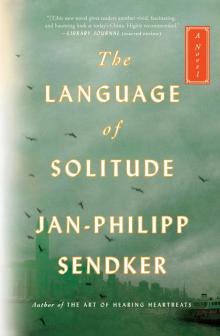 The Language of Solitude
The Language of Solitude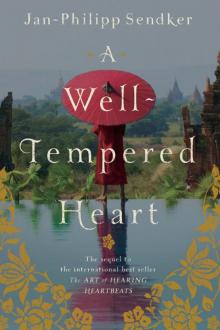 A Well-Tempered Heart
A Well-Tempered Heart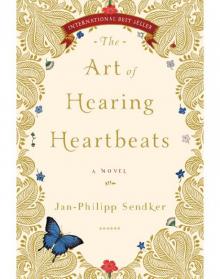 The Art of Hearing Heartbeats
The Art of Hearing Heartbeats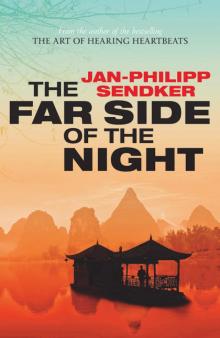 The Far Side of the Night
The Far Side of the Night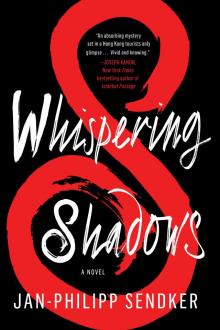 Whispering Shadows
Whispering Shadows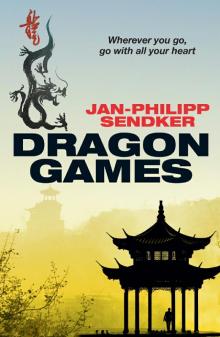 Dragon Games
Dragon Games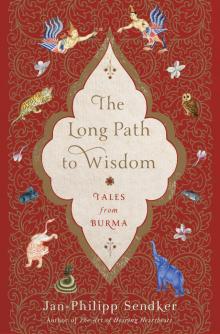 The Long Path to Wisdom
The Long Path to Wisdom